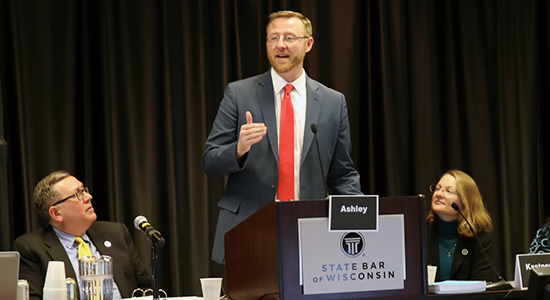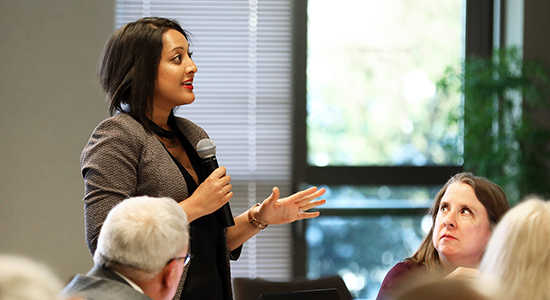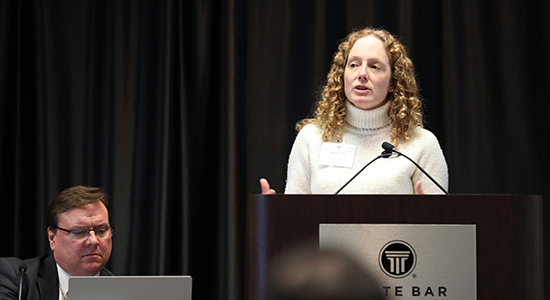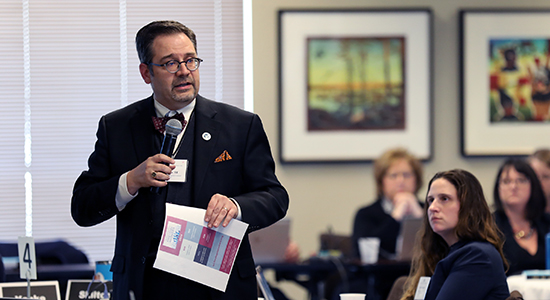
Wisconsin Supreme Court Justice Brian Hagedorn addresses the Board of Governors at the opening of its meeting.
Visit the State Bar’s Facebook page for more photos of this event, or click here.
Feb. 21, 2020 – The State Bar of Wisconsin’s Board of Governors discussed an initial budget proposal for fiscal year 2021, set a dues rebate amount, and heard remarks from Justice Brian Hagedorn, the newest member of the Wisconsin Supreme Court.
The Board of Governors (board), the State Bar’s 52-member policy-making body representing the membership in 16 districts, customarily invites justices and state attorneys general to meet board members and deliver opening remarks at meetings.
Justice Hagedorn was elected to the supreme court last year and is currently serving the first year of a 10-year term. Today, he focused on constitutional history, the judiciary’s role, and the importance of lawyers in shaping the future of democracy.
Hagedorn noted signs of unhealthy government, including contentious fights over the judiciary at the state and federal level. “I don’t think any of us think that’s a real good thing,” he said. He said the judiciary, over time, has expanded its influence.
“Judges have over time taken power that the Constitution has not originally given to us,” he noted. “If the judiciary is the final stopping point for every political question, we no longer have three branches of government the way they were designed to operate.”
Justice Hagedorn, a self-described textualist and originalist, said that the separation of powers means debates on democracy should happen “in the right wrestling ring.”
Hagedorn said lawyers have a particularly unique responsibility for our country and our democracy. He noted that 37 percent of U.S. House members are lawyers, 53 of 100 U.S. Senators are lawyers, and 24 of the last 44 U.S. Presidents were lawyers.
The ideas of limited government and ordered liberty, Justice Hagedorn said, were embraced by the Founding Fathers, and should be embraced and re-embraced today.
“If anybody should be stewards to help defend and protect them, those of us in this room who are leaders, and lawyers, have an obligation to do that,” he said.

NRLD representative Anu Chudasama comments during the meeting.
Board Discusses Proposed FY 2021 Budget
The board discussed, but took no action on, a budget proposal for fiscal year 2021 (July 1, 2020 to June 30, 2021), recommended by the State Bar’s Finance Committee.
The proposed budget of $11.87 million includes a $4 membership dues increase. Currently, membership dues for full-dues paying members is $260 annually.
Membership dues account for about 46 percent of the State Bar’s revenue. The other major revenue stream includes sales and registration revenues from State Bar of Wisconsin PINNACLE®, including books, seminars, and conferences.
State Bar Assistant Executive Director and Chief Financial Officer Paul Marshall said the proposed 1.5 percent dues increase is recommended to fill a deficit gap of about $80,000, identified after several rounds of cost-cutting measures.
“We have provided you with a budget that is realistic, achievable, that does truly adhere to the strategic plans and giving value to the members,” Marshall said.
Dist. 14 Gov. Sherry Coley, chair of the State Bar’s Finance Committee, noted that the Finance Committee and the State Bar’s Strategic Planning Committee conducted joint reviews of all State Bar activities to better align the budget with strategic priorities.
Coley said the budgeting process requires review of each State Bar activity to assess its value to State Bar members, and its value in advancing the organization’s goals.
Budgeting through the strategic planning lens allows the bar to be more creative, innovative, and efficient in addressing the needs of members moving forward, Coley said, as well as ensuring the long-term financial sustainability of the organization.
The board will likely adopt a FY 2021 budget at its April meeting. A final budget must be adopted no later than the board’s June meeting, the last meeting of the fiscal year.

Dist. 14 Gov. Sherry Coley, chair of the State Bar’s Finance Committee, noted that the Finance Committee and the State Bar’s Strategic Planning Committee conducted joint reviews of all State Bar activities to better align the budget with strategic priorities.
Board Sets Keller Dues Rebate
The board approved a Keller dues rebate amount of $11.10 for FY 2021, which is the amount that full-dues paying members can opt to withhold from their dues.
Under Keller v. State Bar of California, 496 U.S. 1(1990), and subsequent rulings, mandatory bar associations can use compulsory dues to fund activities “necessarily or reasonably related to the purposes of regulating the legal profession or improving the quality of legal services.” Keller is codified in Wisconsin SCR 10.03(5)(b)1.
Under Keller, the State Bar is permitted to fund lobbying and other activities related to these purposes with mandatory dues. But lobbying and other activities not germane to those purposes cannot be funded with the compulsory dues of objecting members.
Thus, the State Bar annually calculates the Keller dues rebate – the amount used for activities that cannot be funded with mandatory dues – and objecting members can choose to withhold the rebate amount on their annual dues statements.
In 2018, the board adopted a policy to include all direct state and federal lobbying activity within the Keller rebate calculation, even lobbying activity deemed germane to regulating the legal profession or improving the quality of legal services.
In the past, members have challenged the State Bar’s use of mandatory dues for any direct lobbying activity on First Amendment and other grounds. Those challenges have consistently failed under Keller and subsequent rulings, although a case against the State Bar of Wisconsin is currently pending before the U.S. Supreme Court.
The board’s decision to include all direct lobbying activity in the rebate amount, as a State Bar policy, recognizes the concerns of members who object to the use of mandatory dues for any direct lobbying activity, regardless of what Keller permits.
The Keller rebate amount now includes activities that constitute direct lobbying on policy matters before the Wisconsin Legislature and U.S Congress, “regardless of whether they would otherwise qualify as chargeable under a Wisconsin Keller dues analysis.”

District 1 Gov. Joseph Cardamone makes a point during the budget discussion.
Other Business
-
The board approved the Indian Law Section’s request to amend its bylaws.
-
The board heard various reports, including a report from the Diversity & Inclusion Oversight Committee, the Finance Committee, a legislative report, and board committee reports from the Governance, Policy, and the Strategic Planning committee.
-
Michael Yang, the board’s Building Bridges liaison from the Wisconsin Asian Bar Association, reported on major topics at the 2019 National Asian Pacific Bar Association Conference that he attended.
Upon request, interested members may obtain a copy of the minutes of each meeting of the Board of Governors. For more information, contact State Bar Executive Coordinator Jan Marks by emailor by phone at (608) 250-6106.
